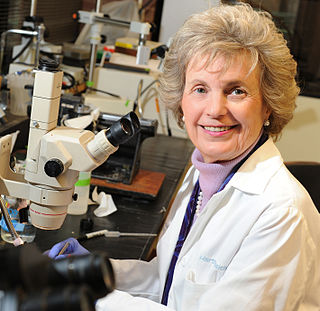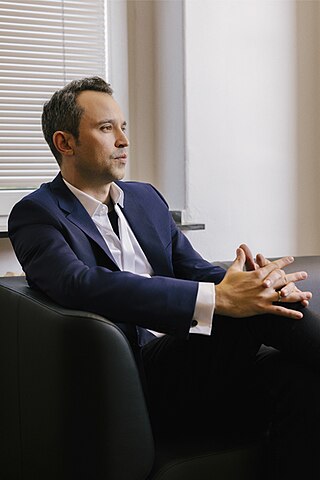Related Research Articles

Transcranial magnetic stimulation (TMS) is a noninvasive form of brain stimulation in which a changing magnetic field is used to induce an electric current at a specific area of the brain through electromagnetic induction. An electric pulse generator, or stimulator, is connected to a magnetic coil connected to the scalp. The stimulator generates a changing electric current within the coil which creates a varying magnetic field, inducing a current within a region in the brain itself.

Oxytocin is a peptide hormone and neuropeptide normally produced in the hypothalamus and released by the posterior pituitary. Present in animals since early stages of evolution, in humans it plays roles in behavior that include social bonding, reproduction, childbirth, and the period after childbirth. Oxytocin is released into the bloodstream as a hormone in response to sexual activity and during labour. It is also available in pharmaceutical form. In either form, oxytocin stimulates uterine contractions to speed up the process of childbirth. In its natural form, it also plays a role in maternal bonding and milk production. Production and secretion of oxytocin is controlled by a positive feedback mechanism, where its initial release stimulates production and release of further oxytocin. For example, when oxytocin is released during a contraction of the uterus at the start of childbirth, this stimulates production and release of more oxytocin and an increase in the intensity and frequency of contractions. This process compounds in intensity and frequency and continues until the triggering activity ceases. A similar process takes place during lactation and during sexual activity.
Neurotechnology encompasses any method or electronic device which interfaces with the nervous system to monitor or modulate neural activity.

The Carl von Ossietzky University of Oldenburg is a university located in Oldenburg, Germany. It is one of the most important and highly regarded educational facilities in northwestern Germany and specialises in interdisciplinary and sustainable development studies and renewable energy studies with focus on solar and wind energy.
Helen S. Mayberg was born in 1956 in California. She is an American neurologist. Mayberg is known in particular for her work delineating abnormal brain function in patients with major depression using functional neuroimaging. This work led to the first pilot study of deep brain stimulation (DBS), a reversible method of selective modulation of a specific brain circuit, for patients with treatment-resistant depression. As of August 2019, she has published 211 original peer-reviewed articles, 31 books and book chapters, and acted as principal investigator on 24 research grants. Mayberg is coinventor with Andres Lozano of “Method for Treating Depression Mood Disorders and Anxiety Disorders using Neuromodulation,” US patent 2005/0033379A1. St. Jude Medical Neuromodulation licensed her intellectual property to develop Subcallosal Cingulate Deep Brain Stimulation for Treatment-Resistant Unipolar and Bipolar Depression for the treatment of severe depression. As of 2018, Mayberg holds positions as Professor of Neurology and Neurosurgery and Professor, Psychiatry and Neuroscience, both at Mount Sinai Medical School, and Professor of Psychiatry, Emory University; Emory University Hospital. Since 2018, she has served as Director, Nash Family Center for Advanced Circuit Therapeutics at the Icahn School of Medicine at Mount Sinai.

C. Sue Carter is an American biologist and behavioral neurobiologist. She is an internationally recognized expert in behavioral neuroendocrinology. In 2014 she was appointed Director of The Kinsey Institute and Rudy Professor of Biology at Indiana University. Carter was the first person to identify the physiological mechanisms responsible for social monogamy.

Thomas Roland Insel is an American neuroscientist, psychiatrist, entrepreneur, and author who led the National Institute of Mental Health (NIMH) from 2002 until November 2015. Prior to becoming Director of NIMH, he was the founding Director of the Center for Behavioral Neuroscience at Emory University in Atlanta, Georgia. He is best known for research on oxytocin and vasopressin, two peptide hormones implicated in complex social behaviors, such as parental care and attachment. He announced on Sept. 15, 2015, that he was resigning as the director of the NIMH to join the Life Science division of Google X. On May 8, 2017, CNBC reported that he had left Verily Life Sciences. Insel is a Co-founder with Richard Klausner and Paul Dagum of a digital mental health company named "Mindstrong," a Bay-area startup. He has also co-founded Humanest Care, NeuraWell Therapeutics, and MindSite News and is a member of the scientific advisory board for Compass Pathways, a company that is developing the psychedelic drug psilocybin to treat depression and other mental health disorders. His book, Healing: Our Path from Mental Illness to Mental Health was published by Penguin Random House in February, 2022.
A serenic, or antiaggressive agent, is a type of drug which reduces the capacity for irritability and aggression.
Frank W. Stahnisch is a historian of medicine and neuroscience at the University of Calgary in Canada, where he holds the endowed Alberta Medical Foundation/Hannah Professorship in the History of Medicine and Health Care. He is jointly appointed in the Department of History, Faculty of Arts, and the Department of Community Health Sciences, Cumming School of Medicine, and is a member of the Calgary Hotchkiss Brain Institute and the O'Brien Institute for Public Health. He has also received an adjunct professorship in the Department of Classics and Religion of the Faculty of Arts. His research interests in the history and philosophy of the biomedical sciences cover: the development of modern physiology and experimental medicine, the history of neuroscience and the history of psychiatry, as well as the development of modern medical visualization practices. Since 2015, he has succeeded Professor Malcolm Macmillan as an Editor-in-Chief of the international "Journal of the History of the Neurosciences", and since 2021 he is also an Associate Editor for the History and Philosophy of the Behavioural Neurosciences with "Frontiers in Psychology"
Clinical neuroscience is a branch of neuroscience that focuses on the scientific study of fundamental mechanisms that underlie diseases and disorders of the brain and central nervous system. It seeks to develop new ways of conceptualizing and diagnosing such disorders and ultimately of developing novel treatments.

Andreas Heinz is a German psychiatrist and neurologist.

Martha G. Welch is an American physician and researcher specializing in the fields of infant and child development. Welch currently serves as a Professor of Psychiatry in Pediatrics and in Pathology & Cell Biology at Columbia University Irving Medical Center. Welch's writing and research focuses on the posited benefits of prolonged close physical contact and eye contact between mothers and children.

Christiane Woopen is a German medical ethicist. She was appointed Professor for Ethics and Theory of Medicine at the University of Cologne in 2009. There she is Executive Director of ceres, an interdepartmental institution created by the Rector and five of the six Faculties of Cologne University. Furthermore, she is Head of the Research Unit Ethics at the Faculty of Medicine and was from 2011 to 2019 Vice-Dean for Academic Development and Gender of that Faculty. From 2012 to 2016 she was Chair of the German Ethics Council and from 2014 to 2016 President of the Global Summit of National Ethics/Bioethics Committees. She has been portrayed by various periodicals.

Synthetic oxytocin, sold under the brand name Pitocin among others, is a medication made from the peptide oxytocin. As a medication, it is used to cause contraction of the uterus to start labor, increase the speed of labor, and to stop bleeding following delivery. For this purpose, it is given by injection either into a muscle or into a vein.

Larry J. Young is the William P. Timmie Professor of Psychiatry and Behavioral Sciences at the School of Medicine at Emory University. He heads the Division of Behavioral Neuroscience and Psychiatric Disorders at Yerkes National Primate Center.

Abraham Zangen is an Israeli professor of neuroscience, head of the brain stimulation and behavior lab and chair of the psychobiology brain program at Ben-Gurion University of the Negev (BGU).
Wolfgang Maier is a German psychiatrist and psychotherapist.

The Rockefeller Neuroscience Institute is an independent, non-profit institution focused on the study of human memory and memory diseases. Founded in 1999, the institute is part of the West Virginia University Medicine Health Sciences Campus, located in Morgantown, West Virginia. The institute is one of the world's leading research centers focusing on innovative procedures to treat Alzheimer's disease and to expand clinical, research and academic missions of neurosurgery, neurology, behavioral medicine, psychiatry and other neuroscience issues.

Ganesan Venkatasubramanian is an Indian psychiatrist and clinician-scientist who works as a professor of psychiatry at the National Institute of Mental Health and Neurosciences, Bangalore (NIMHANS). His overarching research interest to learn the science that will facilitate a personalized approach to understand and treat severe mental disorders like schizophrenia. Venkatasubramanian is known for his studies in the fields of schizophrenia, transcranial Direct Current Stimulation (tDCS), brain imaging, neuroimmunology, neurometabolism and several other areas of biological psychiatry. The Council of Scientific and Industrial Research, the apex agency of the Government of India for scientific research, awarded him the Shanti Swarup Bhatnagar Prize for Science and Technology, one of the highest Indian science awards, for his contributions to medical sciences in 2018. He was also one of the collaborating scientists in the NIMHANS-IOB Bioinformatics and Proteomics laboratory of the Institute of Bioinformatics (IOB) in Bangalore and NIMHANS. Besides, he is an adjunct faculty at the Centre for Brain Research (CBR) in Bangalore.

Julian Koenig is a German neuroscientist who is tenured associated professor of biological child and adolescent psychiatry at University of Cologne. Koenig is co-editor of European Child & Adolescent Psychiatry, affiliate editor of the Journal of Child Psychology and Psychiatry, and consulting editor of Psychophysiology.
References
- ↑ "Rene Hurlemann". National Academy of Sciences. Retrieved 5 January 2019.
- 1 2 "Rene Hurlemann" . Retrieved 5 January 2019.
- ↑ "Universitätsklinik für Psychiatrie und Psychotherapie — Carl von Ossietzky Universität Oldenburg". uol.de. Retrieved 2021-01-18.
- ↑ "Karl-Jaspers-Klinik Wehnen", Wikipedia (in German), 2020-12-03, retrieved 2021-01-18
- ↑ "Personalized Psychiatry". WPA (in German). Retrieved 2021-01-18.
- ↑ Personalized Medicine in Psychiatry Editorial Board.
- ↑ Dichgans, M. (2017-02-01). "Grundlagenforschung für den Kliniker". Der Nervenarzt (in German). 88 (2): 162. doi: 10.1007/s00115-016-0273-z . ISSN 1433-0407. PMID 28175951.
- ↑ "Affective Neuroscience - Board of Directors". www.affect-neuroscience.org. Retrieved 2021-01-18.
- ↑ "NEMO". NEMO. Retrieved 2021-01-18.
- ↑ "Field of research". NEMO. Retrieved 2021-01-18.
- ↑ "TMS Behandlung". NEMO. Retrieved 2021-01-18.
- ↑ Scheele, D. (2012). "Oxytocin Modulates Social Distance between Males and Females". The Journal of Neuroscience . 32 (46): 16074–16079. doi: 10.1523/JNEUROSCI.2755-12.2012 . PMC 6794013 . PMID 23152592.
- ↑ Clemens Boisserée (6 August 2015). ""Der Schreck muss seinen Schrecken verlieren"". General-Anzeiger (in German). Retrieved 5 January 2019.
- ↑ "Oxytocin and social norms reduce xenophobia". University of Bonn. 12 August 2017. Retrieved 5 January 2019.
- ↑ Michelle Castillo (15 November 2012). "Hormone oxytocin may keep men monogamous, study suggests". CBS News. CBS . Retrieved 5 January 2019.
- ↑ Scheele, D.; Wille, A.; Kendrick, K. M.; Stoffel-Wagner, B.; Becker, B.; Gunturkun, O.; Maier, W.; Hurlemann, R. (2013). "Oxytocin leads to monogamy". PNAS . 110 (50): 20308–20313. Bibcode:2013PNAS..11020308S. doi: 10.1073/pnas.1314190110 . PMC 3864312 . PMID 24277856.
- ↑ "Oxytocin and social norms reduce xenophobia". University of Bonn. 12 August 2017. Retrieved 5 May 2019.
- ↑ "Raus aus der Abwärtsspirale negativer Gefühle" [Get out of the downward spiral of negative feelings] (in German). 21 September 2017. Retrieved 5 January 2019.